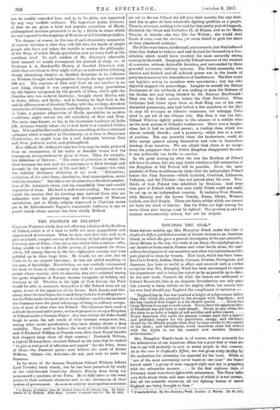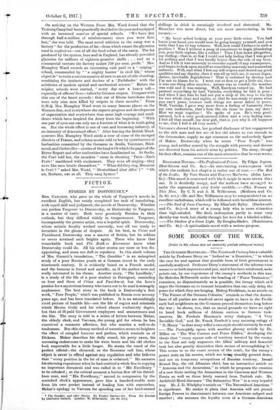TOWARDS THE GOAL.*
SOME sixteen months ago Mrs. Humphxy Ward, under the title of England's Effort, published a series of letters written to an American friend, in which she gave a general description of the part played by Great Britain in the war, the work of our Navy, the rapid progress ot our Armies at home audio France and other battle areas, the mar- vellous development of our munition and other war industries and the part played in them by women. That book, which has been trans- lated into French, Italian, Dutch, Gorman, Russian, Portuguese, and Japanese, has been so useful in effect and received such a cordial reception that Bra. Huraphry Ward has been encouraged to repeat the experiment and to bring her report as far as possible up to date. In the new book, Towards the Goal, the letters are addressed to Colonel Roosevelt, who in an eloquent Introduction not only pays this country a warm tribute on her mighty effort, but asserts that his own land should pay England the compliment of imitation :— "England has in this war reached a height of achievement loftier than that which she attained in the struggle with Napoleon ; and she has reached that height in a far shorter period. . . . Never has Great Britain been put to such a test. Never since the spacious day.; of Elizabeth has she been in such danger. Never, in any crisis, hae she risen to no lofty a height of self-sacrifice and achievement. . . Every American who reads the present volume must feel a hearty and profound resjpect for the patriotism, energy, and efficiency shown by the Britrah people when they became awake to the nature of the crisis • and furthermore, every American must feel stirred with the desire to see his country now emulate Britain's achievement."
Mrs. Humphry Ward's book is, of course, written primarily for the information of our American Allies, hula good deal of what elm hes to say will probably be new to many people in this country. As in the case of England's Effort, she was given every facility by the authorities for obtaining the material for her book. While at "one of the most interesting naval bases on our coast" she found herself amid "a group of men engaged night and day in grappling with the submarine menace. . . . IA the first eighteen days of February there were forty fights with submarines. The Navy taller very little about them and says nothing of which it is not oertain. But all the scientific resources, all the fighting brains of naval England are being brought to bear."
• Tossardstha Boat. ley Mrs. flumithry Ward. London J. Rainy. Ns. ed. adt.1
On arriving on the Western Front Mrs. Ward found that the Training Camp had been practically doubled in the year and equipped with an increased number of special schools. "We have put through half.a-million of reinforcements since you were here last," she was told. The most novel addition to the camp was a factory" for the production of fat—from which comes the glycerine used in explosives—out of all the food refuse of the camp. The fat produced by the system, here and in England, has already provided glycerine for million, of eighteen-pounder shells . . . and as a commercial venture the factory makes 250 per cent. profit." Mrs. Humphry Ward records an interesting visit paid to a " sniping " school, commanded by "'a mighty hunter' in civil life," whose object is" to train a certain number of men to an art of rifle-shooting, combining the instincts and devices of a 'Pathfinder' with the subtleties of modern optical and mechanical science." Before the sniping Schools were started, "every day saw a heavy toll— especially of officers' lives—takenby German snipers. Compare with this one of the latest records: that out of fifteen battalions there were only nine men killed by snipers in three months." From C.H.Q. Mrs. Humphry Ward went to many famous places on the Western line, and everywhere she reports progress and development of organization and everywhere that same high courage and confi- dence which have inspired the Army from the beginning. "With one pair of eyes one can only see a fraction of what is in truth going on. But the whole effect is one of vast and increasing industry, of an intensity of determined effort." After leaving the British Head- quarters Mrs. Humpltry Ward made a tour of some of the ravaged districts of France, and relates stories told to her by eyewitnesses of barbarities committed by the Germans in Senile, Varennea, Herd- ntenil, and Gerbeviller—stories of the kind with which the pages of the Bryce Report and other authorities have familiarized us. At Berths, the Cure told her, the invaders "cause in shouting Paris--Nach Paris ! ' maddened with excitement. They sale all singing—they were like men beside themselves." "What did they sing, Monsieur le Cure ? " asked Mrs. Ward, " Deutschland fiber Alice' 1"" Oh no, Madame, not at all. They sang hymns."





























 Previous page
Previous page